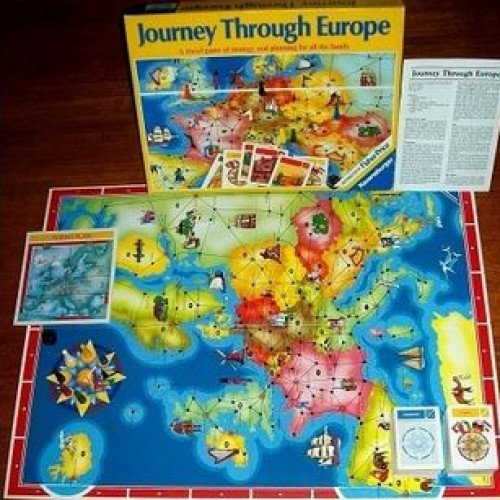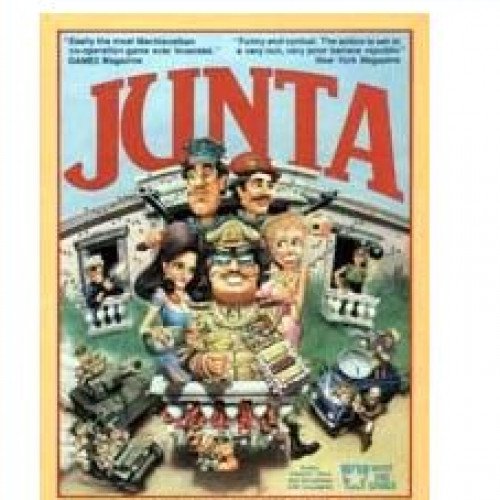"JOURNEY THROUGH EUROPE" vs "JUNTA"

JOURNEY THROUGH EUROPE
Journey through Europe or Explore Europe is a family board game in which the players travel around a map of Europe, rolling a die to move. When they have reached all their objective cities, they try to return home to win. It is one of a series of travel games published by Otto Maier Verlag in Ravensburg starting with Reise um die Erde (Journey around the World), which was their first game in 1884. The publisher is now known as Ravensburger. The European version has been published in several editions. Journey Through Europe is a board game for 2–6 players in which the players try to visit a number of cities on the map of Europe. In 1884, Otto Maier published their first game, Reise um die Erde (Journey around the World). This followed the success of Jules Verne's Around the World in Eighty Days, which was first published in German in 1873 as Reise um die Erde in 80 Tagen. In 1935, Otto Maier Verlag published Deutschlandreise ("Germany Trip"), a game designed by Jochen Zeisse to encourage children to learn the names and locations of German cities. After World War II, a pan-European version of the game was redesigned by Hervert Vladimir Fuka, O. Fairgagnetr and Francesco Ricciardi, and released as Europareise ("Europe Trip") in 1954. Ravensburger subsequently released English versions under the names Journey through Europe and Explore Europe, as well as versions in several other languages.
Statistics for this Xoptio

JUNTA
Junta is a board game designed by Merlin Southwell first published in 1978 by Creative Wargames Workshop and published, as of 1985, by West End Games. Players compete as the corrupt power elite families of a fictional parody of a stereotypical banana republic (specifically Republica de los Bananas) trying to get as much money as possible into their Swiss bank accounts before the foreign aid money runs out. Fighting in the republic's capital during recurrent coup attempts encompasses most of the game's equipment, rules and playtime. This game-within-the-game is however actually tangential to the players' main goal. The length of the game depends on how often coups are declared, but can often exceed six hours. The game's title is taken from the Spanish term "Junta" that originally referred to the executive bodies that frequently came to power after a military coup in 20th century Latin America (the Spanish version is called Golpe, which means coup d'état). In the game, the term refers to the players who declare "Rebel" at the beginning of the coup phase, and—if the coup is victorious—to the players who declare "pro-Junta" at the end of the coup phase to elect a new president. The players of Junta represent corrupt and powerful Banana Republic families. Although players are often executed or assassinated in the course of gameplay, the only real implication of a player's death is the loss of cash and Junta cards he is carrying and a temporary inability to participate until his next turn, when another member of the family steps up to assume the responsibilities of the deceased. Each player is given a family token to underscore this permanent identity, although the token has no effect on game play. Cabinet positions, however, which are denoted by cards, are reassigned each turn.